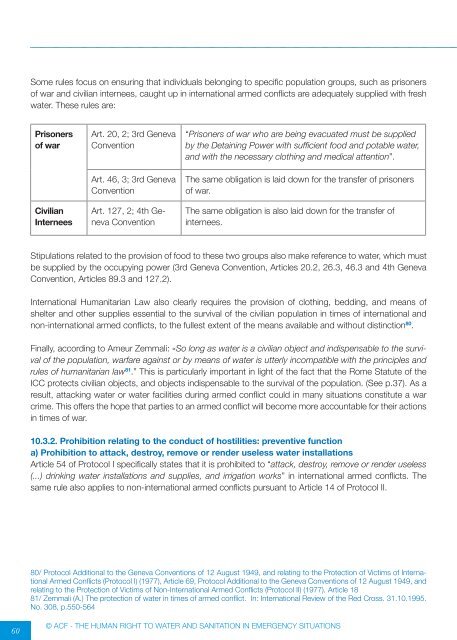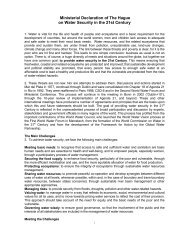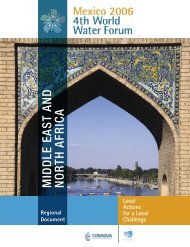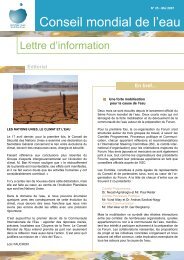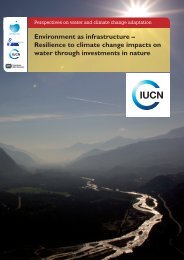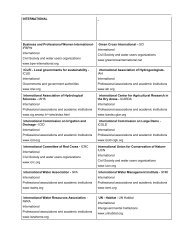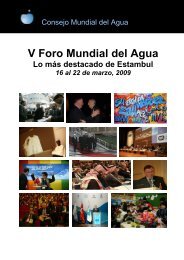the human right to water and sanitation in emergency situations
the human right to water and sanitation in emergency situations
the human right to water and sanitation in emergency situations
You also want an ePaper? Increase the reach of your titles
YUMPU automatically turns print PDFs into web optimized ePapers that Google loves.
60<br />
Some rules focus on ensur<strong>in</strong>g that <strong>in</strong>dividuals belong<strong>in</strong>g <strong>to</strong> specific population groups, such as prisoners<br />
of war <strong>and</strong> civilian <strong>in</strong>ternees, caught up <strong>in</strong> <strong>in</strong>ternational armed conflicts are adequately supplied with fresh<br />
<strong>water</strong>. These rules are:<br />
Prisoners<br />
of war<br />
Civilian<br />
Internees<br />
Art. 20, 2; 3rd Geneva<br />
Convention<br />
Art. 46, 3; 3rd Geneva<br />
Convention<br />
Art. 127, 2; 4th Geneva<br />
Convention<br />
“Prisoners of war who are be<strong>in</strong>g evacuated must be supplied<br />
by <strong>the</strong> Deta<strong>in</strong><strong>in</strong>g Power with sufficient food <strong>and</strong> potable <strong>water</strong>,<br />
<strong>and</strong> with <strong>the</strong> necessary cloth<strong>in</strong>g <strong>and</strong> medical attention”.<br />
The same obligation is laid down for <strong>the</strong> transfer of prisoners<br />
of war.<br />
The same obligation is also laid down for <strong>the</strong> transfer of<br />
<strong>in</strong>ternees.<br />
Stipulations related <strong>to</strong> <strong>the</strong> provision of food <strong>to</strong> <strong>the</strong>se two groups also make reference <strong>to</strong> <strong>water</strong>, which must<br />
be supplied by <strong>the</strong> occupy<strong>in</strong>g power (3rd Geneva Convention, Articles 20.2, 26.3, 46.3 <strong>and</strong> 4th Geneva<br />
Convention, Articles 89.3 <strong>and</strong> 127.2).<br />
International Humanitarian Law also clearly requires <strong>the</strong> provision of cloth<strong>in</strong>g, bedd<strong>in</strong>g, <strong>and</strong> means of<br />
shelter <strong>and</strong> o<strong>the</strong>r supplies essential <strong>to</strong> <strong>the</strong> survival of <strong>the</strong> civilian population <strong>in</strong> times of <strong>in</strong>ternational <strong>and</strong><br />
non-<strong>in</strong>ternational armed conflicts, <strong>to</strong> <strong>the</strong> fullest extent of <strong>the</strong> means available <strong>and</strong> without dist<strong>in</strong>ction 80 .<br />
F<strong>in</strong>ally, accord<strong>in</strong>g <strong>to</strong> Ameur Zemmali: «So long as <strong>water</strong> is a civilian object <strong>and</strong> <strong>in</strong>dispensable <strong>to</strong> <strong>the</strong> survival<br />
of <strong>the</strong> population, warfare aga<strong>in</strong>st or by means of <strong>water</strong> is utterly <strong>in</strong>compatible with <strong>the</strong> pr<strong>in</strong>ciples <strong>and</strong><br />
rules of <strong>human</strong>itarian law 81 .” This is particularly important <strong>in</strong> light of <strong>the</strong> fact that <strong>the</strong> Rome Statute of <strong>the</strong><br />
ICC protects civilian objects, <strong>and</strong> objects <strong>in</strong>dispensable <strong>to</strong> <strong>the</strong> survival of <strong>the</strong> population. (See p.37). As a<br />
result, attack<strong>in</strong>g <strong>water</strong> or <strong>water</strong> facilities dur<strong>in</strong>g armed conflict could <strong>in</strong> many <strong>situations</strong> constitute a war<br />
crime. This offers <strong>the</strong> hope that parties <strong>to</strong> an armed conflict will become more accountable for <strong>the</strong>ir actions<br />
<strong>in</strong> times of war.<br />
10.3.2. Prohibition relat<strong>in</strong>g <strong>to</strong> <strong>the</strong> conduct of hostilities: preventive function<br />
a) Prohibition <strong>to</strong> attack, destroy, remove or render useless <strong>water</strong> <strong>in</strong>stallations<br />
Article 54 of Pro<strong>to</strong>col I specifically states that it is prohibited <strong>to</strong> “attack, destroy, remove or render useless<br />
(...) dr<strong>in</strong>k<strong>in</strong>g <strong>water</strong> <strong>in</strong>stallations <strong>and</strong> supplies, <strong>and</strong> irrigation works” <strong>in</strong> <strong>in</strong>ternational armed conflicts. The<br />
same rule also applies <strong>to</strong> non-<strong>in</strong>ternational armed conflicts pursuant <strong>to</strong> Article 14 of Pro<strong>to</strong>col II.<br />
80/ Pro<strong>to</strong>col Additional <strong>to</strong> <strong>the</strong> Geneva Conventions of 12 August 1949, <strong>and</strong> relat<strong>in</strong>g <strong>to</strong> <strong>the</strong> Protection of Victims of International<br />
Armed Conflicts (Pro<strong>to</strong>col I) (1977), Article 69, Pro<strong>to</strong>col Additional <strong>to</strong> <strong>the</strong> Geneva Conventions of 12 August 1949, <strong>and</strong><br />
relat<strong>in</strong>g <strong>to</strong> <strong>the</strong> Protection of Victims of Non-International Armed Conflicts (Pro<strong>to</strong>col II) (1977), Article 18<br />
81/ Zemmali (A.) The protection of <strong>water</strong> <strong>in</strong> times of armed conflict. In: International Review of <strong>the</strong> Red Cross. 31.10.1995.<br />
No. 308, p.550-564<br />
© ACF - THE HUMAN RIGHT TO WATER AND SANITATION IN EMERGENCY SITUATIONS


